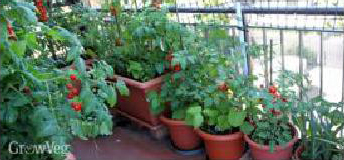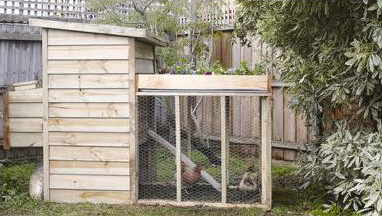Small Space Container Garden – grow herbs like thyme, rosemary, basil, mint, and garlic chives, salad & asian greens ( rocket, lettuce ) and strawberries. If you have a bit more room go for pots of dwarf tomatoes, and chilli bushes. But good sun, not too hot, and water often.

No Dig Garden- on a base of wet newspapers (weed barrier) build a “lasagne” of alternating brown (carbon-based – straw, leaves, wood chips, newspapers) and green (nitrogen-rich – manure, compost, worm castings.) layers. Water each as you build. Perfect for potatoes, beans, pumpkins, & in second year for deeper rooted vegetables –
carrots, onions, beetroot.

Suburban Bush Tucker – edible Australian native plants like muntries, finger lime, warrigal greens, apple-berry, native pig-face, midgen berry, and sea-celery, can add spice to small gardens. In larger spaces, trees like riberry, and macadamia. Resource 3-19.
Swapping your surplus food or buying direct from the grower helps you plan your meals around fresh, in-season fruit, vegetables and herbs. It also reduced “Food Miles” and saves “not quite perfect for supermarkets” food from landfill. Moonee Valley Garden Group – Swap
Store potatoes and onions in the dark and cool, and away from each other, because like bananas, they give off a gas that quick-ripens and spoils other vegetables.
Eat Everything – thoughtful planning means no wasted food, just enough for the one meal, or a cascade of left-overs into other meals. Resource 3-13
Be Wise With Water – hygiene and meal preparation comes first, but develop a plan for the separation and collection of this water, and use it to grow more food.
Buy Imperfect Produce – such as single bananas, ‘the odd bunch’ and unusual shapes.
Basic Compost – collecting your fruit and vegetable peelings and cuttings for an outside, garden compost bin – In-ground, or On-ground to let in the worms & bugs.Household food waste averages 400 kgs per person per year. And half that is food bought, never eaten, and sent straight to landfill. Resource 6-1 & 6-2 Another issue is the huge amount of water used to grow food. In Melbourne, our average household use is 260 litres, but the food grown and processed for that household uses an extra 475lt per day. Resource 3-20
Start a simple food waste diary and get an idea of what you do throw out.
Sort your pantry, bring older items to the front. Plan meals around what you have.Donate your surplus to a charity or the Little Food Pantry
Organise your fridge and cloth wrap cucumber, herbs, capsicum, celery, beans and eggplant, don’t pack the shelves – let the fridge breathe on the inside

Store potatoes and onions in the dark and cool,and away from each other, because like bananas, they give off a gas that quick-ripens and spoils other vegetables.
Eat Everything – thoughtful planning means no wasted food, just enough for the one meal, or a cascade of left-overs into other meals. Resource Be Wise With Water – hygiene and meal preparation comes first, but develop a plan for the separation and collection of this water, and use it to grow more food.
Buy Imperfect Produce – such as single bananas, ‘the odd bunch’ and unusual shapes.
Basic Compost – collecting your fruit and vegetable peelings and cuttings for an outside, garden compost bin – In-ground, or On-ground to let in the worms & bugs.
Active Compost – use a Bokashi type fermentation system, which can process prepared foods, meat, dairy, egg, coffee & tissues into compost Resource 3-12

Compost Farming – start a worm farm and let them turn your fruit and vegetable scraps in liquid fertilizer and rich composted soil.
Active Farming – build a chicken run and nesting box ( or find a neighbour with one ) and feed them with your food scraps. They will eat what they like and crush what they don’t like, creating a composted soil, while laying fresh eggs.
